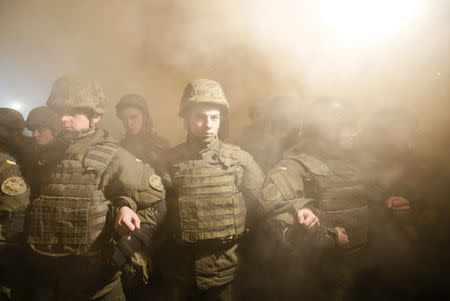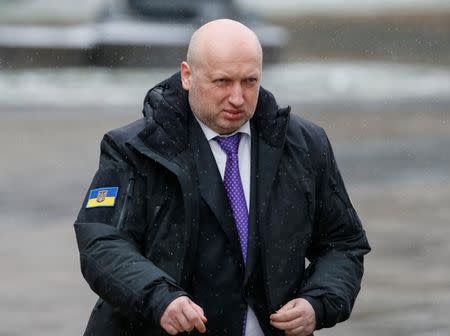Ukraine bans all trade with rebel-held territory, as separatists seize assets
By Pavel Polityuk and Alexei Kalmykov KIEV (Reuters) - Ukrainian authorities on Wednesday halted all cargo traffic with rebel-held territory in the east of the country, formalising an existing rail blockade by Ukrainian activists that has fuelled the worst political crisis in nearly a year. In a standoff that is hurting the economies of both sides, separatists have seized control of strategic Ukraine-registered industries in their territory in response to the rail blockade, which has cut off coal and steel shipments since late January. Tensions have escalated in recent days, leading to clashes between law enforcement agencies and the activists, who have been joined by some members of parliament. The blockade posed a dilemma for President Petro Poroshenko. Breaking it up by force could provoke a major domestic backlash, but allowing it to proceed unilaterally risked undermining the state's authority. Poroshenko's Security and Defence Council introduced the state-led cargo ban to counter what he described as the political and social threat posed by the unofficial blockade. The decision "is dictated by the necessity to prevent the destabilising of the situation in the country, which is being undermined by political operators," he told the council. "Our wish is to prevent social strife." The suspension will remain until rebels hand back control of Ukrainian businesses and comply with a 2015 peace agreement, according to the Security Council. The asset seizures by separatists have mostly affected businesses in the financial and industrial group owned by Ukraine's richest man, Rinat Akhmetov. On Wednesday, Akhmetov's Metinvest and DTEK Energy said their main businesses in rebel-held territory had been taken under separatist control. The two companies, which are the main employers on both sides of the eastern front line, said they had halted production at the affected operations. "The main result will be a dramatic decline in income and a rise in unemployment," said Maksim Timchenko, DTEK's chief executive. The crisis has put pressure on Prime Minister Volodymyr Groysman's government just as it is about to lose its year-long immunity from facing any vote of no confidence. It was appointed last April by a fragile coalition that includes Poroshenko's party, after the previous government fell. Russia, which backs the separatists in the east, called on Ukraine on Wednesday to end the blockade. The situation risked turning into a "humanitarian catastrophe", the Russian foreign ministry said. Rebel leader Alexander Zakharchenko said Ukraine's decision had nothing to do with the separatists, saying it was instead "evidence of an internal power struggle in Kiev." The suspension will further squeeze the Ukrainian economy, already facing potential rolling blackouts and monthly economic losses of up to 4 billion hryvnias ($150 million) from the existing blockade, according to the government. The central bank says expected economic growth could nearly halve this year to 1.5 percent if rail traffic does not resume. Poroshenko expects the government on Thursday to come up with fresh forecasts for the impact of the broader ban on the economy, energy security and currency stability. The trade squeeze has highlighted the complicated economic relationship between the two sides and represents a new phase in a standoff that has killed more than 10,000 people. Germany, which has taken a leading role in trying to end the conflict, said it was seriously concerned about "increasing partitionist tendencies" in eastern Ukraine. Foreign Ministry spokesman Martin Schaefer told a government news conference: "The danger of a military escalation is far from over." He said Berlin was urging Ukraine and Russia to live up to agreements made as part of the 2015 Minsk peace process, citing troubling actions by both sides, including the rebel asset seizures and the government's decision to cut off trade. (Additional reporting by Andrea Shalal in Berlin; Writing by Alessandra Prentice; Editing by Larry King)

 Yahoo News
Yahoo News 



